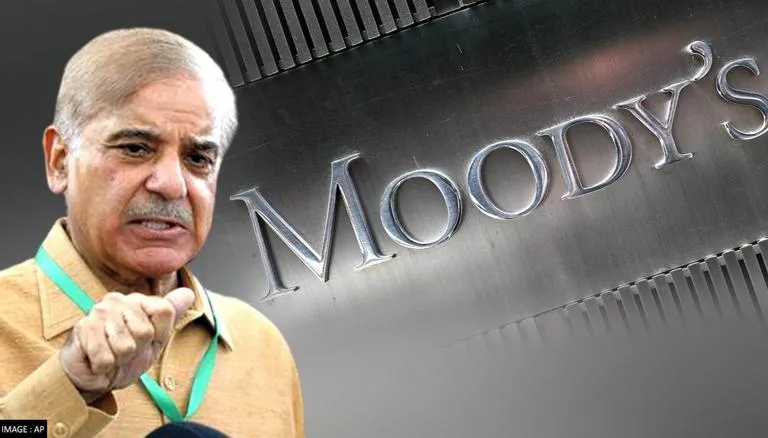Global rating agency Moody’s Investor Service on Thursday downgraded cash-strapped Pakistan’s outlook from stable to negative, citing “heightened external vulnerability” and uncertainty around securing external financing to meet the country’s needs, a media report has said.
Moody’s said that while it was hopeful Pakistan would complete its IMF review and attract further external financing, if Pakistan failed to do so then it could face a balance of payments crisis.
Pakistan has repeatedly been seeking international aid to support its failing economy, the Dawn reported.
The talks with the International Monetary Fund are being held in the Qatari capital Doha.
Saudi Arabia has agreed to provide Pakistan with a “sizable package” of around USD 8 billion to help the cash-starved country bolster dwindling forex reserves and revive its ailing economy.
“Moody’s assesses that Pakistan’s external vulnerability risk has been amplified by rising inflation, which puts downward pressure on the current account, the currency and — already thin — foreign exchange reserves, especially in the context of heightened political and social risk,” Moody’s said in a statement.
It added that the country’s “weak institutions and governance strength” had added uncertainty around the future direction of macroeconomic policy, including whether Pakistan would complete the International Monetary Fund’s (IMF) Extended Fund Facility (EFF) programme and maintain a credible policy path that supports further financing.
However, Moody’s affirmed Pakistan’s B3 local and foreign currency issuer and senior unsecured debt ratings as well as the (P) B3 senior unsecured medium-term note (MTN) programme rating.
MTN allows continuous or intermittent fundraising from investors through the designated or appointed dealers.
Explaining the decision to affirm the B3 rating, Moody’s said it assumed that Pakistan would conclude its seventh review under the IMF EFF programme by the second half of this calendar year and would maintain its engagement with the Fund, leading to additional financing from other bilateral and multilateral partners.
“Moody’s assesses that Pakistan will be able to close its financing gap for the next couple of years. The B3 rating also incorporates Moody’s assessment of the scale of Pakistan’s economy and robust growth potential, which will provide the economy with some capacity to absorb shocks.
“These credit strengths are balanced against Pakistan’s fragile external payments position, weak governance and very weak fiscal strength, including very weak debt affordability,” the statement said.
Moody’s said that the B3 rating affirmation also applied to the backed foreign currency senior unsecured ratings for The Third Pakistan International Sukuk Co Ltd and The Pakistan Global Sukuk Programme Co Ltd.
However, it added that the ceilings for the local and foreign currency country ceilings were lowered to B1 and B3, from Ba3 and B2, respectively.
“The two-notch gap between the local currency ceiling and sovereign rating is driven by the government’s relatively large footprint in the economy, weak institutions, and relatively high political and external vulnerability risk.
“The two-notch gap between the foreign currency ceiling and the local currency ceiling reflects incomplete capital account convertibility and relatively weak policy effectiveness, which point to material transfer and convertibility risks notwithstanding moderate external debt,” the statement said.
Further explaining its reasons for the downgrade, Moody’s said it expected the current account to remain under “significant pressure” due to elevated global commodity prices through 2022 and 2023.
“Pakistan’s current account deficit (CAD) has widened to a cumulative USD 13.8 billion since the start of the current fiscal year in July 2021 up until April 2022, compared to a deficit of USD 543 million in the same period a year earlier. In the absence of an equivalent inflow in the financial account, the rapid widening of the current account deficit has led to a large drawdown of the foreign exchange reserves,” it said.
The statement added that the country’s foreign exchange reserves have declined to USD 9.7bn at the end of April, sufficient to cover only “less than two months of imports”.
Moody’s projected the CAD to come in at 4.5-5 per cent of the GDP for the current fiscal year, slightly wider than the government’s expectations.
“As global commodity prices decline gradually in 2023 and as domestic demand moderates, Moody’s expects the current account deficit to narrow to 3.5-4pc of GDP,” the statement added.
Commenting on the country’s political outlook, Moody’s said: “Political uncertainty in Pakistan remains high, even after the new government has been installed. The new ruling coalition comprises multiple political parties with divergent interests, which is likely to make the enactment of any legislation difficult, including those related to reforms under the IMF EFF programme.” It added that with the elections due by next year, political parties would find it difficult to continually enact significant revenue-raising measures in the run-up to the elections.
Moody’s said it projected real GDP growth to slow down to 4.2 per cent in the next fiscal year from 6 per cent for the current fiscal year.
“The moderation in economic activity reflects the drag on domestic demand from rising inflation and a tightening in monetary policy by the State Bank of Pakistan,” it said, adding, however, that it expected the real GDP to pick up gradually and reach 4.5-5pc over fiscal years 2024 and 2025.
On Pakistan’s fiscal strength, Moody’s said it was “very weak” and expected fiscal consolidation to stall ahead of the next general elections, reported Dawn.

